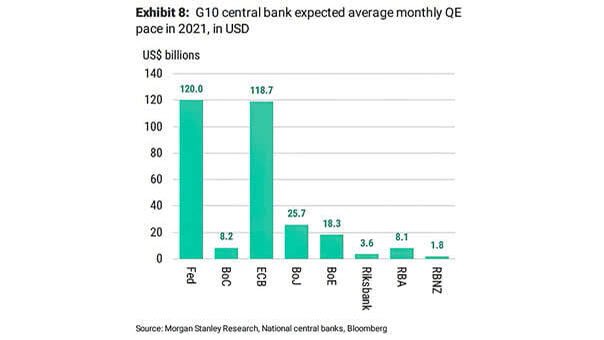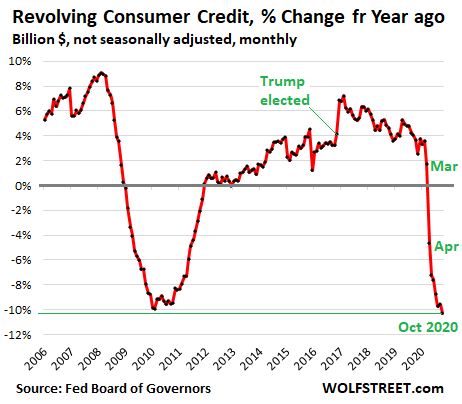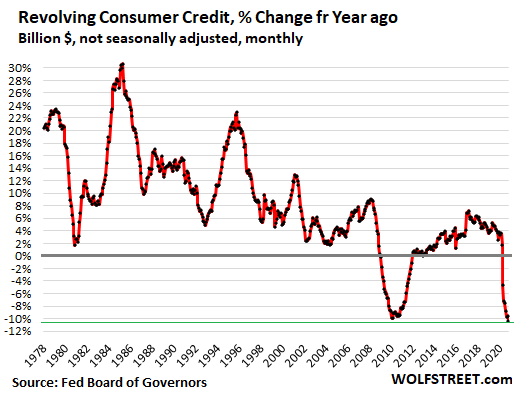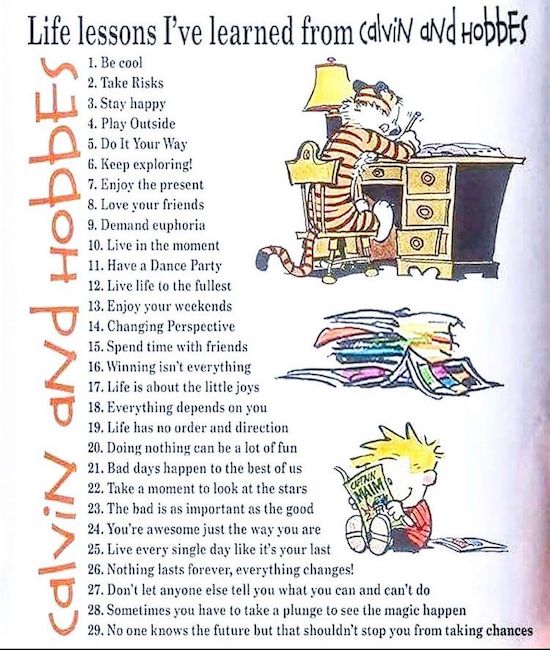
August Strindberg Alpine Landscape I 1894



People with (auto-)immune issues were already not getting a vaccine. Now they add everyone with severe allergies; must be 25% of people?! Re: peanuts, asthma, hay fever. And you can’t travel etc., without proof of being vaccinated. While the CEO for Pfizer says they have no idea if even with the vaccine, you will not infect other people. Where’s the logic? Also, 4 people got facial paralysis after taking the Pfizer vaccine.
No drinkie, no problem!
• No Drinking Alcohol For Two Months After COVID19 Vaccine – Russia (NYP)
Russian officials are warning citizens to avoid alcohol for two months after receiving the country’s COVID-19 vaccine — tough-to-swallow news for one of the world’s heaviest-drinking countries. The warning came from Russian Deputy Prime Minister Tatiana Golikova, who said in an interview that Russians will have to observe extra precautions during the 42 days it takes for the Sputnik V coronavirus vaccine to become effective. “[Russians] will have to refrain from visiting crowded places, wear face masks, use sanitizers, minimize contacts and refrain from drinking alcohol or taking immunosuppressant drugs,” Golikova told TASS News Agency. Anna Popova, the head of Rospotrebnadzor, Russia’s consumer safety watchdog, echoed the sentiments in an interview with Radio Komsomolskaya Pravda, as reported in the Moscow Times.
“It’s a strain on the body. If we want to stay healthy and have a strong immune response, don’t drink alcohol,” she said. According to the World Health Organization, Russia is the fourth-largest consumer of alcohol per person in the world. The average Russian consumes 15.1 liters (almost 4 gallons) of alcohol a year, according to the agency. Russia’s efforts to vaccinate its population began in earnest over the weekend in Moscow. Health authorities in the country estimate that 100,000 people have already been inoculated. “By the end of the week, all regions of the country will join this campaign,” Golikova said. Russian health officials say the Sputnik V vaccine is over 90 percent effective, but reports say medical workers who have taken the shot have come down with COVID-19. Russian President Vladimir Putin has reportedly refused to take it.

Common sense.
• Uni Of Pittsburgh Medical Center Won’t Require Staff To Take Vaccine (ZH)
The University of Pittsburgh Medical Center (UPMC) won’t require its health care employees to take the upcoming COVID-19 vaccine, which the medical provider expects to begin offering as soon as this month, according to PennLive. The reason are several-fold, according to UPMC medical director of infection prevention and epidemiology, Dr. Graham Snyder. For starters, general uncertainty over the vaccine. And while the $21 billion nonprofit organization (which employs 89,000 people) has a mandatory flu vaccination policy, it’s “based on decades of experience with the influenza vaccine,” according to Snyder. “But there’s no comparable data for a COVID-19 vaccine, or on whether a mandate is the best way to get large numbers of people to become vaccinated, Snyder said on Tuesday.
The first COVID-19 vaccine, from Pfizer, is expected to soon receive emergency approval. A second vaccine, from Moderna, is also expected to soon receive emergency approval. Distribution of at least one vaccine is expected to begin this month. Snyder said UPMC is “very excited about the preliminary information we have about how safe the vaccine is and how it will work.” Still, he said UPMC will conduct its own review of the vaccines before injecting any of its employees.” -PennLive. “Until we learn more and build our own experience with this vaccine, plus, until we see the uptake of vaccine in our communities, and have an understanding about the role that vaccination has in ending this pandemic, it’s not the right thing to make it mandatory,” said Snyder – who added that UPMC’s independent review won’t slow down their plans to distribute the vaxx.
On Tuesday, UPMC outlined their plans for receiving and distributing shots of the vaccine – while planning to launch an information campaign ‘to persuade the public to get vaccinated’ – despite their own hesitance over the jab. Perhaps it has something to do with several UPMC employees having participated in vaccine trials, only to report fever, fatigue or arm pain, with some needing to take a day or two off from work. According to Snyder, this is “a normal and healthy immune response.”

See my article Sunday: 95% Vaccine Efficacy? Not So Fast.
• ‘95% Effective’ May Not Mean What You Think It Means (Neuburger)
To a lay person, a phrase like “95% effective” means one of two things: either that she or he, upon exposure to the virus, is protected 95% of the time, or that 95% of the people who take the vaccine are protected 100% of the time. And this is where the mutual eagerness of the two highly motivated groups — the public; the profiteers — intersect. The public wants to hear “95% effectiveness” and think it knows what those words means. The drug companies want the same thing as the public; it wants the public to think it knows what those words mean. But in the world of drug advertising, the word “effective” does not mean what you think it means. The other way to look at effectiveness is this: Based on the numbers released from phase 3 trials, the Pfizer vaccine is 95% effective, but 1% of the time. In the same way, the Moderna vaccine is 94% effective, but 2% of the time.
To sort this out, let’s look at real numbers, thanks to Twitter friend David Windt. For the Moderna product, the phase 3 trial contained 30,000 individuals divided between those given the vaccine and those given a placebo. Let’s assume that individuals in each group were allowed to roam freely “in the wild” — that is, told to live their regular lives among the general population, including going out infrequently, staying masked, and practicing social distance — as opposed being proactively and aggressively exposed to the virus by the researchers, which would be highly immoral, to say the least. In the Moderna vaccinated group, 11 people out of 15,000 got the virus (by Moderna’s definition of what “got the virus means”) for an overall infection rate of 0.07%. (There’s disagreement about whether the drug company’s “got the virus” measurements are well chosen [..] But we’ll ignore that point for now.)
In the Moderna placebo group, 185 people of 15,000 got the virus, for an overall infection rate of 1.23%. Do you see where this is headed? If you divide 0.07% by 1.23%, you get a 5.7% infection rate — or inversely, a 94% protection rate, which is what’s claimed. But that’s a percentage of a percentage, a ratio of a ratio, something called the “relative rate” in the medical profession. What this really means is that, of the 1.23% of people who would have gotten the virus in the vaccinated group, 94% of them didn’t. But Moderna isn’t testing 30,000 people who are infected with the virus, or even 15,000 people. Only 185 people “got the virus” (by their definition) in the placebo group. That population was reduced to 11 people with vaccination. These are very small numbers. As stated above, the Moderna vaccine is 94% effective — but only 1.23% of the time.
[..] For comparison, let’s look at the absolute numbers from the Moderna test. In the unprotected population, 1.23% of the people who could have been exposed to the virus, got it. In the vaccinated population exposed to the same conditions, a little less than 0.07% got the virus. Subtracting the two, the absolute gain in protection was 1.16% — that is, taking the vaccine bought you a little over 1% in absolute protection. The numbers for the Pfizer vaccine are similar. According to Windt, “the infection rate was reduced slightly, from 0.75% to 0.04% – that’s “95% efficacy” [but] these results do NOT mean that 95% of those vaccinated are protected.” In absolute terms, taking the Pfizer vaccine reduced the risk of getting the virus by just 0.71%.

No matter how much people dump on this, it was always going to go this route.
• Trump Campaign, 16 Other States Join Texas Motion To Supreme Court (JTN)
The Trump campaign and seventeen states have now joined a motion filed in Texas asking the Supreme Court to delay the conclusion of the election in four key states based on concerns of potentially unconstitutional voting systems and procedures. Texas Attorney General Ken Paxton late Monday asked the country’s highest court to invalidate the Nov. 3 election results in Georgia, Michigan, Pennsylvania and Wisconsin, arguing officials in those four battleground states violated the Constitution by making changes to how ballots were cast and counted without legislative approval. Paxton’s suit asks the justices to issue a temporary restraining order preventing the states “from taking action to certify presidential electors or to have such electors take any official action including without limitation participating in the Electoral College.”
The Supreme Court as of Wednesday afternoon had yet to publicly say whether it will hear the case. In the meantime, 17 other states have signed on as amici curiae, signaling their support of the suit’s efforts. Missouri, Arkansas, Nebraska and others announced that they mutually hold “several important interests in this case.” On Wednesday, the Trump campaign also announced that it was intervening in the suit on the side of Texas. The campaign said in an announcement that President Trump’s “rights as a candidate are affected by the Defendant States’ failure to follow and enforce state election laws during the 2020 election.” “After reviewing the motion filed by Texas in the U.S. Supreme Court, I have determined that I will support the motion in all legally appropriate manners,” Arkansas Attorney General Leslie Rutledge, a Republican, tweeted late Tuesday.
“The integrity of our elections is a critical part of our nation and it must be upheld.” Also late Tuesday, Missouri Attorney General Eric Schmitt said on Twitter that his state is “in the fight” after Texas announced its election challenge. The court deciding to hear the case would be a huge victory for President Trump’s lawyers and others trying to get the courts to investigate voter fraud, states’ last-minute changes to voting laws and numerous other issues, all in hope of having the certification of the 2020 presidential race delayed and potentially overturned.
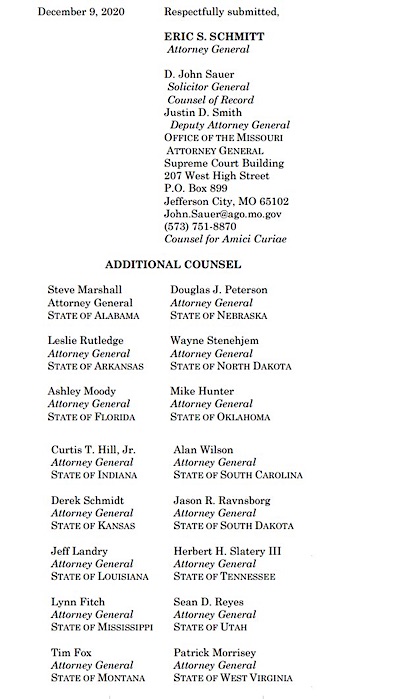

17 now. That’s a sizeable chunk of America.
• Trump To Meet With Ten State Attorneys General Backing Case To Overturn Election (F.)
President Donald Trump is scheduled to meet with a group of Republican state attorneys general at the White House on Wednesday – most of whom are engaged in or supporting an effort to overturn the results of the presidential election – as he still refuses to concede just days before the electoral college is set to vote. Trump is scheduled to have lunch with the attorneys general in the cabinet room of the White House at 12:45pm EST, according to a public schedule released by the White House Wednesday evening. The list of attendees, provided to Forbes by White House spokesperson Judd Deere, includes Texas Attorney General Ken Paxton, who is spearheading the lawsuit, which is aimed at overturning the results in Michigan, Wisconsin, Pennsylvania and Georgia. Also on the list are the attorneys general of Alabama, Arkansas, Florida, Indiana, Louisiana, Mississippi, Missouri, South Carolina and Utah, all of whom signed an amicus brief released Wednesday supporting the Texas case.
Also expected to attend is Arizona Attorney General Mark Brnovich – who represents a state Biden won and who filed a separate amicus brief “respecting” the Texas lawsuit – and Kentucky Attorney General Daniel Cameron, who did not join either brief. The case – which Trump called “the big one” and said he would be “intervening” in – seeks to invalidate electors in the four key states based on allegations the states expansions of mail-in voting due to Covid-19 resulted in substantial fraud. The fraud claims pushed by the lawsuit have continuously been rejected by courts, with one election law expert deriding the case as, “utter garbage. Dangerous garbage, but garbage.”


“The only way to resolve suspicions is with full transparency and public awareness. That will be the goal of the hearing.”
• Sen. Ron Johnson Does Not Rule Out Challenging Electoral College Results (JTN)
Sen. Ron Johnson is not ruling out the possibility of challenging the Electoral College results in January when Congress is slated to certify the vote. “I would say it depends on what we found out,” the Wisconsin Republican said to reporters when he was asked about whether he plans on challenging election results, according to The Hill. “The American people need more information. I’m not ready to just close and slam the book on this thing and go ‘OK, let’s walk away from it.'” Republican Rep. Mo Brooks of Alabama has indicated that he intends to object to some states’ Electoral College votes. Johnson, who chairs the Senate Homeland Security and Governmental Affairs Committee, announced Wednesday that the committee will hold a hearing next week about election irregularities.
“Today I gave notice for a hearing for next Wednesday titled ‘Examining Irregularities in the 2020 election,'” the senator said in a statement. “I am mindful that many of the issues that have been raised have been, and will continue to be, appropriately resolved in the courts. But the fact remains that a large percentage of the American public does not view the 2020 election result as legitimate because of apparent irregularities that have not been fully examined. That is not a sustainable state of affairs for our country. The only way to resolve suspicions is with full transparency and public awareness. That will be the goal of the hearing.”
Ron Johnson
Reminder that we issued a report in September
that highlighted Hunter Biden’s foreign business dealings.Tonight with @seanhannity⬇️ pic.twitter.com/EyZSNpzqty
— Senator Ron Johnson (@SenRonJohnson) December 10, 2020

I wonder about the timing here. The probe started in 2018, and he says he only learned about it yesterday? He had zero idea for over 2 years?
• Hunter Biden Under Federal Investigation For Possible Tax Fraud (NYP)
President-elect Joe Biden’s son revealed Wednesday that he’s under federal investigation for possible tax fraud, with a report saying the Justice Department is examining his overseas business dealings. The probe also reportedly involves a laptop that belonged to Hunter Biden, the existence of which was first reported by The Post, and which contains communciations and documents detailing some of his business dealings in China and Ukraine. Hunter Biden, 50, disclosed the probe in a statement released by his father’s presidential transition office. “I learned yesterday for the first time that the U.S. Attorney’s Office in Delaware advised my legal counsel, also yesterday, that they are investigating my tax affairs,” Hunter Biden said in the statement.
“I take this matter very seriously but I am confident that a professional and objective review of these matters will demonstrate that I handled my affairs legally and appropriately, including with the benefit of professional tax advisors.” A statement attributed to “the Biden-Harris Transition” said, “President-elect Biden is deeply proud of his son, who has fought through difficult challenges, including the vicious personal attacks of recent months, only to emerge stronger.” The probe began in 2018, sources told Fox News and CNN. Investigators are looking into whether Hunter and his business associates violated various tax and money laundering laws, CNN said. The probe is focused on Hunter’s business dealings in China and other countries and invovles transactions with people who posed counterintelligence concerns, CNN said.
The investigation was put on hold during the run-up to the November election due to Justice Department guidelines that prohibit activity that could influence a political race, CNN said. But it’s since resumed and is entering a new phase, with the FBI and IRS issuing subpoenas and seeking interviews, CNN said. Fox News reported that the probe includes examining the Hunter Biden laptop exposed by The Post, citing two sources familiar with the investigation. The probe is before a grand jury, and involves so-called “Suspicious Activity Reports” from banks flagging transfers of funds from China and other nations, Fox News also said.
In September, Republican senators released a report on Hunter’s business affairs that said he “and his family were involved in a vast financial network that connected them to foreign nationals and foreign governments across the globe.” Some of those ties “raise criminal financial, counterintelligence and extortion concerns,” the report said. Wednesday’s surprise disclosure of the federal probe came exactly one year after FBI agents seized a laptop from a Delaware computer shop whose owner claims it was left there by Hunter and never retrieved.

Greenwald. “We have our old friends who are at the top of America’s core inner circle of power and influence.”
• Hunter Biden Criminal Probe Bolsters Claim About Beijing’s Influence In US (GG)
Hunter Biden acknowledged today that he has been notified of an active criminal investigation into his tax affairs by the U.S. Attorney for Delaware. Among the numerous prongs of the inquiry, CNN reports, investigators are examining “whether Hunter Biden and his associates violated tax and money laundering laws in business dealings in foreign countries, principally China.” Documents relating to Hunter Biden’s exploitation of his father’s name to enrich himself and other relatives through deals with China were among the cache published in the week before the election by The New York Post — revelations censored by Twitter and Facebook and steadfastly ignored by most mainstream news outlets. That concerted repression effort by media outlets and Silicon Valley left it to right-wing outlet such as Fox News and The Daily Caller to report, which in turn meant that millions of Americans were kept in the dark before voting.
But the just-revealed federal criminal investigation in Delaware is focused on exactly the questions which corporate media outlets refused to examine for fear that doing so would help Trump: namely, whether Hunter Biden engaged in illicit behavior in China and what impact that might have on his father’s presidency. The allegations at the heart of this investigation compel an examination of a fascinating and at-times disturbing speech at a major financial event held last week in Shanghai. In that speech, a Chinese scholar of political science and international finance, Di Donghseng, insisted that Beijing will have far more influence in Washington under a Biden administration than it did with the Trump administration.
The reason, Di said, is that China’s ability to get its way in Washington has long depended upon its numerous powerful Wall Street allies. But those allies, he said, had difficulty controlling Trump, but will exert virtually unfettered power over Biden. That China cultivated extensive financial ties to Hunter Biden, Di explained, will be crucial for bolstering Beijing’s influence even further. Di, who in addition to his teaching positions is also Vice Dean of Beijing’s Renmin University’s School of International Relations, delivered his remarks alongside three other Chinese banking and development experts. [..] The centerpiece of Di’s speech was the history he set forth of how Beijing has long successfully managed to protect its interests in the halls of American power: namely, by relying on “friends” in Wall Street and other U.S. ruling class sectors — which worked efficiently until the Trump presidency.
Referring to the Trump-era trade war between the two countries, Di posed this question: “Why did China and the U.S. use to be able to settle all kinds of issues between 1992 [when Clinton became President] and 2016 [when Obama’s left office]?” He then provided this answer: “No matter what kind of crises we encountered — be it the Yinhe incident [when the U.S. interdicted a Chinese ship in the mistaken belief it carried chemical weapons for Iran], the bombing of the embassy [the 1992 bombing by the U.S. of the Chinese Embassy in Belgrade], or the crashing of the plane [the 2001 crashing of a U.S. military spy plane into a Chinese fighter jet] — things were all solved in no time, like a couple do with their quarrels starting at the bedhead but ending at the bed end. We fixed everything in two months. What is the reason? I’m going to throw out something maybe a little bit explosive here. It’s just because we have people at the top. We have our old friends who are at the top of America’s core inner circle of power and influence.”

Swalwell needs to be investigated for real.
• House Intel GOP Not Told About Eric Swalwell Relationship With Chinese Spy (NYP)
House Intelligence Committee Republicans were surprised to learn this week that a member of their panel, Democratic Rep. Eric Swalwell, was targeted by a suspected Chinese spy who slept with US politicians as a tactic to elicit information. Swalwell, who represents a California district south of Oakland, received an FBI “defensive briefing” in 2015 on operative Fang Fang, but most if not all Republicans on the elite committee weren’t told that a colleague had been targeted by China. Fang, also known as Christine Fang, returned to China in mid-2015 as US officials heightened their scrutiny of her string of honey-trap seductions. She reportedly fundraised for Swalwell’s 2014 re-election campaign before he joined the Intelligence Committee in 2015.
A congressional Republican source told The Post that Intelligence Committee Republicans had not been informed of the relationship. The committee is supposed to have access to some of the nation’s most sensitive information to fulfill its oversight role of shadowy government programs. If the Chinese operation occurred as described in a bombshell Tuesday article in Axios, it’s unclear why lawmakers aside from Swalwell were kept in the dark, especially since Fang may have targeted Swalwell due to his proximity to sensitive information. The Post asked Swalwell’s 12 Democratic colleagues on the Intelligence Committee, including Chairman Adam Schiff (D-Calif.), about when they learned of Swalwell’s association with Fang, but they did not immediately reply.
Swalwell has not said if he had a romantic relationship with Fang, who allegedly seduced two Midwest mayors as part of her operation from 2011 to 2015. He claimed in a Wednesday CNN appearance that he “can’t talk too much about the details of the case” because the information should be kept secret. The issue is likely to dog Swalwell as Republicans demand more information. “Did Schiff and [House Speaker Nancy] Pelosi know? Why did no one take any steps to keep sensitive intel, at least as it relates to China, far away from a member who is at best potentially compromised?” a Republican close to the White House told The Post.

Lots of China stories all of a sudden.
• Secret Deal Gave Chinese Spies Free Rein In Switzerland (G.)
The full text of a secret deal between Switzerland and China that allowed Chinese security officials access to the country at Swiss taxpayers’ expense has been revealed for the first time as the government pushes to renew it. The five-year “readmission agreement”, which was signed in 2015 and expired on Monday, lay out terms for Chinese agents to travel to Switzerland and interview suspected Chinese nationals that Swiss authorities wished to deport. Unlike more than 50 similar deals Switzerland has signed with other countries, it was never published by the government and was not even publicly acknowledged until August. The official English translation of the agreement has been obtained by Safeguard Defenders, an Asia-focused human rights campaign group.
It reveals an extraordinary commitment to secrecy within an agreement that had itself been concealed from the public, the group says. The “experts” from the ministry of public security (MPS) had to be invited on the two-week “missions”, but once the invitation had been issued China could choose its agents without Swiss approval. They could enter the country without official status, and Switzerland committed to keeping their identity confidential. The reports they produced for Swiss authorities were also kept secret. Readmission deals are a regular part of international law, but Safeguard Defenders said the 2015 arrangement with Beijing, which was not reciprocal, was of “an entirely different character” from others signed by Switzerland.
The secrecy surrounding both the agreement itself and the work of Chinese agents, the choice of partner – a security super-ministry with extensive remit including police and intelligence services – and even the presence of agents were unusual. “In only a minority of cases [do other readmission] deals allow for the other party to send representatives to accompany the individual to be returned, and in those cases [the representatives] are limited to that specific activity, and it is a public, official duty being carried out,” Safeguard Defenders said. The deal was extremely favourable to the Chinese and went above and beyond normal migration information-sharing arrangements, said Margaret Lewis, a law professor at Seton Hall University in the US.

If Crossfire Hurricans is not thoroughly and indepenndently investigated, how will the FBI ever recover?
• Clinton Associate 2016 Anti-Trump Dossier Claimed Russian FSB Source (JTN)
Evidence released by the Senate this month reveals that longtime Hillary Clinton associate Cody Shearer received anti-Trump dirt in 2016 from a Russian intelligence source and got it into the hands of the FBI through the ex-British spy Christopher Steele. Shearer’s claim that his information came from a Russian FSB source, experts say, should have alerted senior US officials that the FBI’s investigation of the Trump campaign’s ties Russia was compromised by its sources, Clinton surrogates and alleged Russian spies. The documents also indicate the State Department played a much larger role than previously reported in shaping the media narrative, and eventually the official Obama administration intelligence assessment that Vladimir Putin wanted Trump to win in 2016, lawmakers said.
“Clinton confidantes and campaign surrogates repeatedly sought information from individuals with links to known or suspected Russian intelligence officers and assets,” Senate Homeland Security and Governmental Affairs Committee Chairman Ron Johnson, R-Wis, told Just the News. “This demonstrates the double standard and bias of the FBI’s investigation of only Trump campaign officials for their contacts with Russian agents. Americans deserve equal justice, and the FBI has a long way to go before its integrity and credibility is restored.” The new documents released jointly by Johnson’s committee and the Senate Finance Committee chaired by Chuck Grassley sheds significant new light on the extensive network of Clinton associates who participated and exerted influence on the 2016-17 effort to falsely portray Trump as the agent of a hostile power.
One of Shearer’s reports, alleging that Trump was compromised by Russian intelligence, made its way to the FBI shortly before the 2016 election through a series of Clinton allies. It included Steele, the British ex-spy who authored a now-debunked dossier tying the Trump campaign and associates to Kremlin officials. Steele submitted the Shearer memo, titled “FSB Interview,” to the FBI as a supplement to his own Trump-Russia reporting funded by the Clinton campaign. In a prefatory note to the Shearer memo, Steele wrote to his FBI handlers that “some of the reporting is remarkably similar” to his own, especially regarding “TRUMP’s compromise by the FSB,” and the “funding of the TRUMP campaign.” Steele dated Shearer’s memo Oct. 19, 2016. Two days later, the FBI obtained a Foreign Intelligence Surveillance Act warrant on Trump adviser Carter Page based on some of the information from Steele’s dossier.

For the banks.
• ECB To Unveil Yet Another Stimulus Package (R.)
The European Central Bank will unveil fresh stimulus measures on Thursday to prop up the recession-hit currency bloc long enough for a coronavirus vaccine to be deployed and its devastated economy to start to heal. With fresh support measures already promised, only the details of the package remain up in the air. But the bottom line is clear: borrowing costs will be kept close to zero for years so that governments and firms can spend their way out of the biggest recession in living memory. The ECB’s challenge will be to balance a growing range of short-term risks against improving long term prospects, indicating that its move will be big but lack the “shock and awe” impact of previous crisis-fighting measures.
“With the positive news in terms of vaccine development, Europe is now starting to see the light at the end of the tunnel,” Oxford Economics said in a note. “However, the short-term outlook remains extremely challenging, with euro zone GDP likely to contract in the fourth quarter.” For now, the 19-country euro zone is facing a triple shock: a lingering second wave of the pandemic, the prospect of a hard Brexit and political stalemate over the European Union’s 750 billion euro ($908 billion) recovery fund. But all three are seen as temporary shocks, with the political strife likely to be resolved and the pandemic easing by the spring, leaving the ECB with the task of getting the bloc through a difficult winter.
The economy also recovered surprisingly quickly after the first wave of coronavirus lockdowns, suggesting more resilience than is built into economic models. Fresh projections could thus point to lower growth in 2021 but better prospects in 2022, leaving the overall growth path little changed.

This is supposed to happen under Biden?
• Federal Trade Commission Calls For Breakup Of Facebook (NBC)
The Federal Trade Commission sued to break up Facebook on Wednesday, asking a federal court to force the sell-off of assets such as Instagram and WhatsApp as independent businesses. “Facebook has maintained its monopoly position by buying up companies that present competitive threats and by imposing restrictive policies that unjustifiably hinder actual or potential rivals that Facebook does not or cannot acquire,” the commission said in the lawsuit filed in federal court in Washington, D.C. The lawsuit asks the court to order the “divestiture of assets, divestiture or reconstruction of businesses (including, but not limited to, Instagram and/or WhatsApp),” as well as other possible relief the court might want to add.
The announcement is a major step that has been years in the making, with Facebook and several other major U.S. technology companies having grown quickly in the past 10 years with little government oversight. But the lack of scrutiny has changed recently, with a series of lawsuits that now threaten to rein in the dominance of big American tech firms that have grown to be among the world’s most valuable companies. Attorneys general from 48 states and territories said they were filing their own lawsuit against Facebook, reflecting the broad and bipartisan concern about how much power Facebook and its CEO, Mark Zuckerberg, have accumulated on the internet. Facebook’s share price fell by as much as 4 percent after the news, before paring its losses.
“Breakup Facebook” has become a rally cry for the company’s critics — from Sen. Elizabeth Warren, D-Mass., to one of Facebook’s wealthy founders, Chris Hughes, who last year wrote a 6,000-word case for a break-up. But the idea has never been truly attempted in court. Facebook said it was reviewing the two lawsuits, and pointed out that the FTC approved the Instagram and WhatsApp acquisitions at the time. “Years after the FTC cleared our acquisitions, the government now wants a do-over with no regard for the impact that precedent would have on the broader business community or the people who choose our products every day,” Facebook said in a statement, adding that it would have more to say soon.

We try to run the Automatic Earth on donations. Since ad revenue has collapsed, you are now not just a reader, but an integral part of the process that builds this site.
Click at the top of the sidebars for Paypal and Patreon donations. Thank you for your support.





Support the Automatic Earth in virustime, election time, all the time. Click at the top of the sidebars to donate with Paypal and Patreon.




